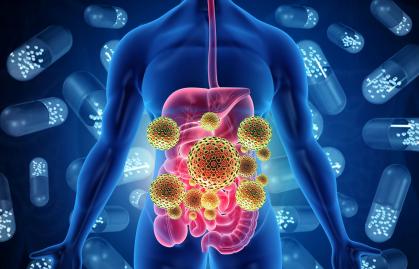New Formula Developed by Rutgers Researcher Proves Promising in Alleviating Gastrointestinal Syndrome in Long-Haul COVID-19 Patient by Shifting Gut Microbiota

A Rutgers researcher’s new formula with Investigational New Drug (IND) status has successfully alleviated a patient’s long-term severe gastrointestinal (GI) illness associated with post-acute COVID-19 syndrome, or long-haul COVID, in a recent study. The study’s results on the formula developed by Liping Zhao, Ph.D., are now published in an article titled “Nutritional Modulation of Gut Microbiota Alleviates Severe Gastrointestinal Symptoms in a Patient with Post-Acute COVID-19 Syndrome” in mBio, a peer-reviewed journal of the American Society for Microbiology.
Zhao’s high-fiber nutritional modulation of gut microbiota formula - NBT-NM108 - showed the feasibility of improving the patient’s GI and other symptoms at a moment when public health authorities have reported concerns about long-term, post-COVID conditions and as the pandemic enters its third year. This study was the first to show the potential efficacy of treating long-haul COVID by targeting the gut microbiota. The Centers for Disease Control and Prevention (CDC) has defined post-COVID or chronic COVID as “new, returning, or ongoing health problems for four or more weeks” from the onset of the virus. Multiple institutions worldwide have estimated that millions of patients are affected by this syndrome.
“We treated the long COVID patient through single patient expanded access, a process approved by the FDA through very rigorous guidelines,” explained Zhao, Eveleigh-Fenton Chair of Applied Microbiology, and professor at Rutgers School of Environmental and Biological Sciences in New Brunswick.
“The patient, a frontline worker, also had some health preconditions like prediabetes, but she didn’t have Gl problems. During her COVID-19 infection, she developed a very severe GI syndrome including nausea, vomiting and abdominal pain. She just couldn’t eat, couldn’t go back to work. She was really suffering,” said the study’s physician and the patient’s gastroenterologist Weizheng Wang, M.D. and associated professor of medicine at Rutgers New Jersey Medical School
The patient was infected with COVID-19 in early 2020 but the GI symptoms she developed persisted for over a year. The patient and Wang agreed she could benefit by the modulation of her gut microbiota, and she was treated for two months with Zhao’s high-fiber formula. In addition to her GI syndrome, the patient was also suffering from palpitations and anxiety, conditions that were also alleviated by the end of the microbiota-targeted nutritional intervention.
Wang explains that COVID-19 patients have reported symptoms like abdominal pain, loss of appetite, nausea, vomiting and diarrhea that could be caused by the virus binding to the angiotensin-converting enzyme 2 (ACE2) receptors in intestinal epithelial cells, thereby infecting, damaging, and causing inflammation in the intestines.
According to Zhao, patients with dysbiotic gut microbiota having more opportunistic pathogens in the gut could be at risk of developing GI complications. His NBT-NM108 formula combines selective fibers with diverse physical and chemical structures for providing energy to a group of beneficial gut bacteria that could reduce populations of opportunistic pathogens by helping recover and stabilizing a healthy gut ecosystem.
During the study, the patient’s treatment including the novel formula showed a quick response in the first week. As the patient started eating, her dose was adjusted. The patient was monitored on her daily symptoms, medications intake, and microbiota formula consumption through breath, blood, and fecal samples. Her results were compared with data collected four months before the intervention with the high-fiber formula. The results, now published, establish that the high intake of the NBT-NM108 formula significantly alleviated her severe GI symptoms and other health problems.
“Breath hydrogen analysis showed that the patient had a condition called small intestine bacterial overgrowth, or SIBO. Patients with SIBO produce a large amount of gas by bacterial fermentation within 1-2 hours after a meal when foods enter small intestine. The high pressure built up may drive symptoms such as nausea, vomiting, and abdominal pain. Her SIBO was alleviated after a few weeks on the formula as indicated by very little hydrogen produced within the first 4 hours after a meal,” Zhao explained.
The next step for Zhao and his team at Rutgers will be to conduct a randomized controlled phase 2 trial to further demonstrate the safety and efficacy of the microbiome nutrition formula NBT-NM108 for alleviating post-acute COVID-19 patients with GI symptoms.
The NBT-NM108 formula is also being tested in other clinical trials including patients with Parkinson’s disease, multiple sclerosis, and patients receiving colon cancer chemotherapies.
NBT-NM108 is a product of a Rutgers startup, Notitia Biotechnologies Company. Zhao is a co-founder of Notitia.



